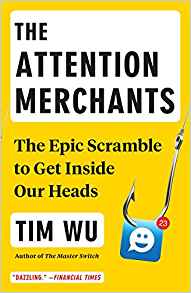 After reaching a goal of reading 52 books in 2017 (finishing with 61) I set out to read 100 in 2018. The idea was not just to read more, but to remain mindful and focused in a culture that seems hell bent on having every second occupied by noise and distraction.
After reaching a goal of reading 52 books in 2017 (finishing with 61) I set out to read 100 in 2018. The idea was not just to read more, but to remain mindful and focused in a culture that seems hell bent on having every second occupied by noise and distraction.
It’s not easy. We live in a world where people bring smart phones to church, yoga class, and the gym, three places where presumably they’re trying to engage in mindfulness. It’s impossible to wait anywhere – medical office, airport, auto shop – without being surrounded by blaring televisions. Sports event operators have determined that loud sound effects must continue at all times, even during play. Every store and restaurant plays music – loudly – without interruption.
Even the public library has thrown in the towel. My local branch has a room set aside for kids to play video games. This has become so popular that they have added computer monitors in the newspaper and magazine reading area since, apparently, there are so few readers of those items that they won’t mind hearing kids shouting at screens as they play video games.
So the library, a place once meant for quiet reading, is now a Fortnite gathering place.
Reading 100 books in 2018 would prove challenging. My rules were the same as 2017. No skimming. Fitness books, cookbooks, and non-narrative travel books would not count toward the total. The vast majority should be non-fiction.
I fell shy of the century mark, finishing with 79 (55 non-fiction, 24 fiction). Unlike the 61 books of 2017, I read more fiction and included some shorter books. (My 79 books ranked only second in my house as my school librarian wife, as usual, read more than 100).
Here’s what I learned from those 79 books and the process of reading them:
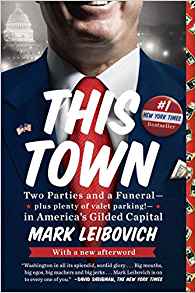 EVEN FEWER PEOPLE READ BOOKS IN PUBLIC – I made it a point in 2018 to look for people reading books in public. I eat a lot at Chipotle, a place where you’re likely to wait in line. Not once did I see someone reading a book, though one young cashier would comment on what I was reading, as if to say how cute it was that this guy her father’s age still read books.
EVEN FEWER PEOPLE READ BOOKS IN PUBLIC – I made it a point in 2018 to look for people reading books in public. I eat a lot at Chipotle, a place where you’re likely to wait in line. Not once did I see someone reading a book, though one young cashier would comment on what I was reading, as if to say how cute it was that this guy her father’s age still read books.
I took my older son to get his drivers license – the one place guaranteed to require a wait – and saw nobody among the 100-plus people in the DMV waiting area reading a book.
The one place people still read books? That would be airplanes. Maybe it’s because we don’t yet have 100 percent Wi-Fi saturation. Perhaps it’s because using electronic devices is not yet allowed for entire flights. Maybe it’s because people know to bring reading material for the inevitable delays. I still was usually among the only ones reading a book in a terminal, where Wi-Fi is now universal.
READING IN PUBLIC CAN BE DANGEROUS: My sons swim and play basketball. Which means I spend a lot of time at practices and games/meets, which have a lot of down time. Swim parents understand the grind of spending five hours at a morning swim meet session to see a child swim for perhaps 7 minutes, less if they compete in sprint events.
This year, however, being a sports parent became dangerous. On two occasions at AAU basketball tournaments, I somehow managed to focus on my book intently enough to miss the escalating arguments around me. Thankfully I looked up in time to move, avoiding getting caught between opposing team parents coming to blows.
BOOKS ARE CHEAPER ALL THE TIME: This is because with fewer people competing for books at the public library, it’s easier to reserve and quickly receive new releases. As an author, I’m not proud to say that I checked out 74 of the 79 books I read from the library. But this is a blog about lean living, after all, so it makes sense to save money and avoid accumulating. Plus I left Amazon reviews for many books and those are more valuable to authors.
READING KEEPS KIDS READING: We had two teenage boys in our home for the first time in 2018 and keeping males of that age reading books is a challenge. As much as I’d like to think they follow my example, I’ve realized the key is to read quality young adult fiction together. Our older son even dusted off and re-read his five Gregor the Overlander books, perhaps the best of the many young adult series we’ve read over the years and arguably the best work of Suzanne Collins, better known for The Hunger Games.
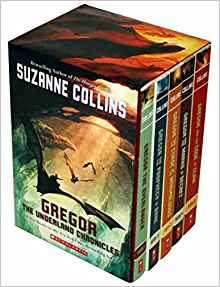 We also read the final five of Alex Scarrow’s nine-book Time Riders series, which accounted for four of the five books we could not find in the library and thus purchased. We also enjoyed the first two books in Scarrow’s Plague Land series, Michael Grant’s two prequels to his terrific Gone saga, and the addictive historical fiction of Alan Gratz (Refugee, Prisoner B-3087, and Projekt 1065).
We also read the final five of Alex Scarrow’s nine-book Time Riders series, which accounted for four of the five books we could not find in the library and thus purchased. We also enjoyed the first two books in Scarrow’s Plague Land series, Michael Grant’s two prequels to his terrific Gone saga, and the addictive historical fiction of Alan Gratz (Refugee, Prisoner B-3087, and Projekt 1065).
I always let our guys read anything by Florida writers Tim Dorsey and Carl Hiaasen, who unfortunately combined for just one new book in 2018. Dorsey’s Pope of Palm Beach was outstanding.
Mira Grant’s zombie apocalypse trilogy (Feed, Deadline, Blackout), which features as heroes a group of ass-kicking teenage bloggers who master the new media world and the world in general, was the dark horse hit of the year in our house.
As for my solo reading, it fell mostly into three categories:
CHILD REARING: As the parent of teenagers in a screen-addicted, micromanaged, helicopter-parent world in which little from my own childhood seems applicable, I’m always on the prowl for good advice. I found plenty this year in Ron Lieber’s The Opposite of Spoiled, Adam Alter’s Irresistible: The Rise of Addictive Technology, The Trouble with Boys by Peg Tyre, and The Self-Driven Child by Ned Johnson and William Stixrud.
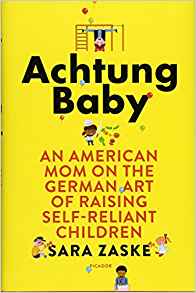 American Girls: Social Media and the Secret Lives of Teenagers by Nancy Jo Sales should be mandatory reading for every parent with minor kids and ranked among the more disturbing books I read all year. Sara Zaske’s Achtung Baby about life as an American raising kids in Germany was a fascinating look at how Germans raise kids in a hands-off, free-range manner most U.S. Gen X parents will recognize from their own childhoods. And Lenore Skenazy’s Free-Range Kids details how we no longer let our kids do anything without adult supervision.
American Girls: Social Media and the Secret Lives of Teenagers by Nancy Jo Sales should be mandatory reading for every parent with minor kids and ranked among the more disturbing books I read all year. Sara Zaske’s Achtung Baby about life as an American raising kids in Germany was a fascinating look at how Germans raise kids in a hands-off, free-range manner most U.S. Gen X parents will recognize from their own childhoods. And Lenore Skenazy’s Free-Range Kids details how we no longer let our kids do anything without adult supervision.
After reading Dave Grossman’s Assassination Generation: Video Games, Aggression, and the Psychology of Killing, which analyzes the link between videogames and violence, especially school shootings, I plan to read the rest of his work in 2019.
FINANCIAL/MINIMALISM: This is a blog about lean living, after all. So I read Scott Trench’s Set for Life: Dominate Life, Money, and the American Dream, Crash Proof 2.0 by Peter Schiff, Vicki Robin’s Your Money or Your Life, and Lynne Twist’s The Soul of Money. I read Charles Long’s How to Survive without a Salary, figuring most of us must at some point.
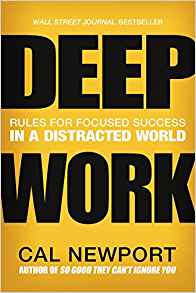 Tim Wu’s The Attention Merchants is an exhaustive chronicle of how marketers, entertainment producers and Silicon Valley types have stolen our attention over the last 200 years. It might have been my most thought-provoking book of the year. If we think in terms of what we give our attention to – how we pay attention – it changes how we use our most precious asset: time.
Tim Wu’s The Attention Merchants is an exhaustive chronicle of how marketers, entertainment producers and Silicon Valley types have stolen our attention over the last 200 years. It might have been my most thought-provoking book of the year. If we think in terms of what we give our attention to – how we pay attention – it changes how we use our most precious asset: time.
There were a barrage of books and articles in 2018 on how to focus in a screen-addicted world. Cal Newport’s Deep Work is a good start.
William McRaven’s Make Your Bed and Carl Hiassen’s Team Rodent were the shortest books I read all year. McRaven’s was little more than a print version of his compelling keynote speech, but a powerful message. I read Hiassen’s epic takedown of Disney when it came out in 1998 and this year it served as a reminder of why I’ve never taken my kids to one of its theme parks.
SPORTS: Though I’m no longer a full-time sports writer, I still follow sports and in 2018 wanted to read some books that have long been on my list.
I understand now why some rank David Halberstam’s The Breaks of the Game as the greatest sports book ever. If you read that book on the late 1970s NBA and Halberstam’s Playing for Keeps book about Michael Jordan and his era (as I did in 2018), you’d have an in-depth understanding of the history of the NBA.
What a shame that the exhaustive reporting that Joan Ryan did for her 1995 book Little Girls in Pretty Boxes about the abusive and insular USA Gymnastics culture did not bring about change. Perhaps the horrors of Larry Nassar could have been avoided.
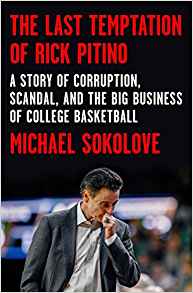 I’m a sucker for any sort of season-inside sports book where a talented writer follows a high school team. Amy Bass’s One Goal, which chronicles a team of mostly Somali refugees playing for a Maine high school soccer team, rightly ranks among the best sports books of the year. Hope: A School, a Team, a Dream by Bill Reynolds, published in 2017, shows that the hoop dream dramas chronicled in 1994 by Darcy Frey in The Last Shot, which I finally read, have not changed.
I’m a sucker for any sort of season-inside sports book where a talented writer follows a high school team. Amy Bass’s One Goal, which chronicles a team of mostly Somali refugees playing for a Maine high school soccer team, rightly ranks among the best sports books of the year. Hope: A School, a Team, a Dream by Bill Reynolds, published in 2017, shows that the hoop dream dramas chronicled in 1994 by Darcy Frey in The Last Shot, which I finally read, have not changed.
Other sports books I enjoyed included Chris Nashawaty’s Caddyshack: Making of a Hollywood Cinderella Story, Jeff Pearlman’s Football for a Buck account of the USFL, Ben Reiter’s look at the success of the Houston Astros (AstroBall) and Baseball Cop by Eddie Dominguez. I didn’t think there was anything more I needed to know about Tiger Woods, but when you put the investigative team of Jeff Benedict and Armen Keteyian together (for a book called simply Tiger Woods), you get a lot of new material and a fresh perspective.
Michael Sokolove has an underrated career of quality sports investigative work. His latest, The Last Temptation of Rick Pitino, is an awkward title but a thorough expose on how corrupt and sleazy college basketball has become. Gilbert Gaul’s Billion Dollar Ball provides a similar look at college football.
My new favorite author is Mark Leibovich, whose Big Game: The NFL in Dangerous Times exposed NFL owners and the media who cover them as possessing similar egos. Leibovich mostly covers politics and his earlier book This Town, about the 2012 Presidential campaign, was just as entertaining. Who knew there were so many similarities between David Gregory and Adam Schefter?
As the parent of a competitive swimmer, I’m always looking for great swimming reads. Not sure we’ve had any iconic books yet in this field, though I read some solid ones in 2018 in Michael Silver’s Golden Girl (about Natalie Coughlin and the Cal swim team) and Anthony Ervin’s Chasing Water. Missy Franklin’s 2016 book Relentless Spirit left me thinking she would retire soon and two weeks after I finished she did just that.
Some books don’t fit into any of those three categories. Here’s the list of 79, in order read and date finished. My goal for 2019 is to (finally) read 100. If you’ve read this far and have suggestions, please let me know.
*Fiction
*Refugee – Alan Gratz (Jan. 1)
The Opposite of Spoiled – Ron Lieber (Jan. 3)
*Prisoner B-3087 – Alan Gratz (Jan. 4)
*The Party – Robyn Harding (Jan. 4)
Set for Life: Dominate Life, Money, and the American Dream – Scott Trench (Jan. 6)
*Projekt 1065 – Alan Gratz (Jan. 12)
Crash Proof 2.0 – Peter Schiff (Jan. 22)
*TimeRiders: Gates of Rome – Alex Scarrow (Feb. 2)
*TimeRiders: City of Shadows – Alex Scarrow (Feb. 5)
Outliers – Malcolm Gladwell (Feb. 10)
*The Pope of Palm Beach – Tim Dorsey (Feb. 14)
Irresistible: The Rise of Addictive Technology – Adam Alter (Feb. 22)
*Time Riders: The Pirate Kings – Alex Scarrow (Feb. 24)
Your Money or Your Life – Vicki Robin (Feb. 28)
The Trouble with Boys – Peg Tyre (March 4)
One Goal – Amy Bass (March 11)
How to Survive without a Salary – Charles Long (March 14)
The Self-Driven Child – Ned Johnson and William Stixrud (March 20)
*Time Riders: The Mayan Prophecy – Alex Scarrow (March 23)
*Time Riders: The Infinity Cage – Alex Scarrow (March 30)
Getting to Us – Seth Davis (April 5)
The Attention Merchants – Tim Wu (April 10)
*Diary of a Wimpy Kid/The Getaway – Jeff Kinney (April 11)
*The Finisher – David Baldacci (April 15)
Make Your Bed – Willam McRaven (April 17)
Seal Team Six – Howard Wasdin (April 21)
Team Rodent – Carl Hiaasen (April 27)
Natural Born Heroes – Christopher McDougall (May 1)
Lou – Lou Piniella (May 12)
*The Keeper – David Baldacci (May 17)
Superfans – George Dohrmann (May 20)
American Girls: Social Media and the Secret Lives of Teenagers – Nancy Jo Sales (May 22)
I’m Keith Hernandez – Keith Hernandez (May 24)
Tiger Woods – Jeff Benedict-Armen Keteyian (May 28)
The Day My Butt Went Psycho – Andy Griffiths (June 12)
*Plague Land – Alex Scarrow (June 24)
Hope: A School, a Team, a Dream – Bill Reynolds (June 30)
How to Raise Kind Kids – Thomas Lickona (July 1)
*Feed – Mira Grant (July 5)
Boundaries – Henry Cloud (July 8)
*Deadline – Mira Grant (July 19)
The Breaks of the Game – David Halberstam (July 22)
Caddyshack: Making of a Hollywood Cinderella Story – Chris Nashawaty (July 26)
*Blackout – Mira Grant (July 28)
Media Madness – Howard Kurtz (Aug. 2)
Glow Kids – Nicholas Kardaras (Aug. 5)
Deep Work – Cal Newport (August 9)
Playing for Keeps (Michael Jordan) – David Halberstam (Aug. 12)
Achtung Baby – Sara Zaske (Aug. 18)
The Last Shot – Darcy Frey (Aug. 21)
Free-Range Kids – Lenore Skenazy (Aug. 25)
Winning Bigly – Scott Adams (Aug. 28)
I’ll Be Gone in the Dark – Michelle McNamara (Aug. 31)
*Monster – Michael Grant (Sept. 4)
Astroball – Ben Reiter (Sept. 6)
Baseball Cop – Eddie Dominguez (Sept. 10)
Freakonomics – Steven Levitt & Steven Dubner (Sept. 13)
If You’re in My Office, It’s Already Too Late – James Sexton (Sept. 16)
The Greatest Salesman in the World – Og Mandino (Sept. 19)
Until it Hurts – Mark Hyman (Oct. 3)
*Her Pretty Face – Robyn Harding (Oct. 10)
Football for a Buck – Jeff Pearlman (Oct. 13)
The Man I Never Met – Adam Schefter (Oct. 14)
The Last Temptation of Rick Pitino – Michael Sokolove (Oct. 18)
Big Game: The NFL in Dangerous Times – Mark Leibovich (Oct. 28)
*Plague Land Reborn – Alex Scarrow – (Oct. 31)
The Soul of Money – Lynne Twist – (Nov. 6)
Billion Dollar Ball – Gilbert Gaul – (Nov. 12)
This Town – Mark Leibovich – (Nov. 26)
*Villain – Michael Grant – (Nov. 29)
Don’t Worry, Make Money – Richard Carlson (Dec. 4)
Golden Girl – Michael Silver & Natalie Coughlin (Dec. 8)
Relentless Spirit – Missy Franklin (Dec. 10)
Little Girls in Pretty Boxes – Joan Ryan (Dec. 13)
*The Darkest Minds – Alexandra Bracken (Dec. 26)
Assassination Generation – Dave Grossman (Dec. 29)
*Gregor the Overlander – Suzanne Collins (Dec. 29)
Chasing Water – Elegy of an Olympian – Anthony Ervin (Dec. 30)
*Gregor the Overlander: The Prophecy of Bane – Suzanne Collins (Dec. 31)
